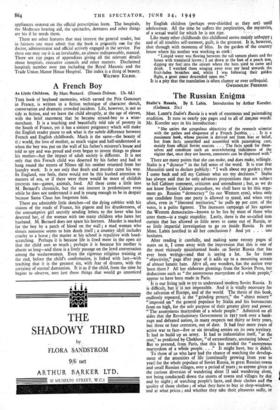A French Boy
As Little Children. By Marc Bernard. (Dennis Dobson. 12s. 6d.)
THIS book of boyhood memories, which earned the Prix Goncourt in France, is written in a fiction technique of character sketch, conversation and dramatic crowded incident. Life, however, is not as tidy as fiction, and we leave the child abruptly, at the age of eleven, with the brief statement that he became errand-boy to a wine- merchant. It is a touching and beautifully told tale of poverty in the South of France, yet it has a sinister poignancy which will make the English reader pause to ask what is the subtle difference between French and English childhoods. Much is the same—the beauty of
world, the love of mother, so much vague and half-understood as when the boy was put on the wall of his father's mistress's house and told to spy and was proud and even began to invent things to please his mother—but the impact of adult society is different. It is not only that this French child was deserted by his father and had to hang round the streets of Nimes till his mother returned from her laundry work. It is not only that death and murder came his way. In England, one feels, there would not be this hushed attention to matters of sex, or if there were there would be more of childish interests too—games, animals, food. All these come a little into M. Bernard's chronicle, but the sex interest is predominant even while he does not understand it and is young enough to be in despair because Santa Claus has forgotten him.
There are admirable little sketches—of the dying cobbler with his visions of the roads of France, his pigeon and his drunkenness, of the consumptive girl secretly sending letters to the lover who has deserted her, of the woman with too many children who hates her husband. M. Bernard does not spare his horrors. Murder is marked for the boy by a patch of blood on the wall ; a mad woman who shouts nonsense seems to him death itself ; a country idyll includes cruelty to a horse ; the master at his school is repulsive with head- scratching. Perhaps it is because life is lived more in the open air that the child sees so much ; perhaps it is because his mother is absent so long—and there is a lively passage on the lewd conversation among the washerwomen. Even the rigorous religious training at the end, before the child's confirmation, is linked with lust—with teaching that it is the greatest sin, with fear of dreams, with the certainty of eternal damnation. It is as if the child, from the time he begins to observe, sees just those things that would go unnoticed by English children (perhaps over-shielded as they are) until adolescence. All the time he suffers the perplexities, the mysteries, of a sexual world for which he is not ripe.
Like many other childhoods this childhood seems mainly unhappy ; and of all troubles self-torment, guilt, is the greatest. It is, however, shot through with moments of bliss. In the garden of the country house where his mother was working as cook :
" Limpid water was flowing between the tall tomato plants and the beans with translucid leaves ; I sat down at the foot of a peach tree, dipping my feet into the stream where the bees used to come and drink. I watched them winging away over my head towards the fruit-laden branches and, whilst I was following their golden flight, a great peace descended upon me."
It is a pity that the translation is often clumsy or over colloquial.
GWENDOLEN FREEMAN.


































 Previous page
Previous page